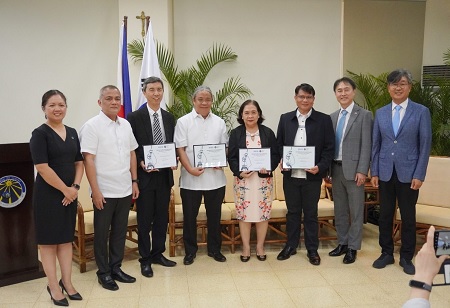
PhilSA and KOICA Deliver Pandora Instruments for Advanced Air Quality Monitoring

 During Philippine Space Week, the Philippine Space Agency (PhilSA) and the Korea International Cooperation Agency (KOICA) celebrated a major advancement in air quality monitoring, forecasting, and research with the ceremonial handover of Pandora instruments at Heyden Hall, Manila Observatory.
During Philippine Space Week, the Philippine Space Agency (PhilSA) and the Korea International Cooperation Agency (KOICA) celebrated a major advancement in air quality monitoring, forecasting, and research with the ceremonial handover of Pandora instruments at Heyden Hall, Manila Observatory.
The turnover of the Pandora instruments celebrated the strengthening partnership between the Republic of the Philippines and the Republic of Korea in advancing air quality research in the country. This milestone followed the formal signing of the Record of Discussion between PhilSA and KOICA in August 2023. Attendees included PhilSA Director General Dr. Joel Joseph Marciano, Jr., the Ambassador of the Republic of Korea to the Philippines H.E. Lee Sang-hwa, and KOICA Country Director Kim Eunsub.
A key component of the Pan-Asia Partnership for Geospatial Air Pollution Information and the Pandora Asia Network (PAPGAPI-PAN) Philippines project is the comprehensive monitoring of air quality across the country through both ground-based and satellite measurements. The project employs Pandora instruments to continuously measure air quality within a 500 m to 1-km range during daylight hours. Complementing these ground-based measurements is the Geostationary Environment Monitoring Spectrometer (GEMS) satellite, launched by the Republic of Korea in February 2020 and the first of its kind dedicated to air quality monitoring from a geostationary orbit.
During his opening remarks, PhilSA Director General Dr. Joel Joseph Marciano, Jr. expressed that the turnover of Pandora instruments is a significant milestone that embodies the spirit of collaboration, progress, and shared commitment. “By nurturing and harnessing Yamang Kalawakan (“space riches”) and integrating the benefits of space into Filipino society and culture, we will reach our common destination of a nation bridged, uplifted, and empowered through the peaceful uses of outer space with international cooperation as a vital tool to achieve this mission”, PhilSA Director General Marciano, Jr. added.
“With this turnover, the initiative has entered the implementation phase. It aims to enhance the Philippines’ air quality monitoring capabilities by integrating satellite and ground measurements, with Pandora instruments reading real-time, calibrated air quality data. This will support evidence-based [and] science-based policymaking and strengthen national capacity to address air pollution”, H.E. Lee Sang-hwa, Ambassador of the Republic of Korea to the Philippines, highlighted in his message.
The initial Pandora instrument was set up at the Manila Observatory in Quezon City on July 19, 2024. Additional installations are planned for Cebu, Puerto Princesa, and Ilocos Norte by the end of September this year. These locations were carefully selected to cover both urban air quality (Manila and Cebu) and rural or background air quality. The instruments will be managed by partner institutions, including the Department of Environment and Natural Resources–Environmental Management Bureau (DENR–EMB), Manila Observatory, University of San Carlos, and Mariano Marcos State University.
After installation, local operators will handle the maintenance and operation of the Pandora instruments, working closely with PhilSA. PhilSA will concentrate on analyzing the data and integrating it with satellite observations, especially from the GEMS satellite. By using Pandora data for validation, PhilSA aims to create a detailed nationwide air quality map, which will be crucial for developing policies and strategies to improve air quality throughout the Philippines.

